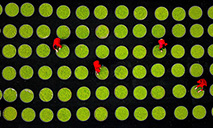S.Korea's headline inflation hits 10-year high on soaring energy price
SEOUL, April 5 (Xinhua) -- South Korea's headline inflation hit the highest in over 10 years last month due to soaring energy price, statistical office data showed Tuesday.
The consumer price index (CPI) stood at 106.06 in March, up 4.1 percent from the same month of last year, according to Statistics Korea.
It marked the highest growth in over 10 years since December 2011, hovering above 3 percent for the sixth straight month since October last year.
The headline inflation surpassed the Bank of Korea (BOK)'s mid-term inflation target of 2 percent for 12 months in a row.
To tackle inflationary pressure, the BOK hiked its policy rate by a quarter percentage point to 1.25 percent in January, after raising the rate by 25 basis points in August and November last year.
The March CPI was driven by expensive oil products, the price of which raised the overall inflation by 1.32 percentage points.
Oil products price surged 31.2 percent in March from a year earlier, logging the fastest gain in four months. Prices for gasoline and diesel jumped 27.4 percent and 37.9 percent respectively.
Dubai crude, South Korea's benchmark, averaged 110.9 U.S. dollars per barrel in March, up from 92.4 dollars in the previous month.
Price for processed food such as bread went up 6.4 percent last month amid a higher global price for grain, posting the highest increase since April 2012.
Price for industrial products, including oil products and processed food, picked up 6.9 percent in March from a year ago. It was the highest rise in more than 13 years since October 2008.
Private services price advanced 4.4 percent on higher eating-out cost, caused by the raw materials price hike.
Expense for dining-out soared 6.6 percent in March, lifting the overall inflation by 0.83 percentage points. It recorded the highest growth in almost 24 years since April 1998.
Public services price added 0.6 percent in March, after climbing 0.9 percent in February thanks to lower educational expense.
Price for agricultural, livestock and fishery products rose 0.4 percent in March, after going up 6.3 percent in January and 1.6 percent in February each.
Prices for onion and apple plummeted 50.0 percent and 20.0 percent each, while pork price was higher 9.4 percent in March after surging 12.4 percent in the prior month.
Housing rent, including Jeonse and monthly rent, moved up 2.0 percent last month.
Jeonse is South Korea's unique contract between two households where a landlord grants the two-year residential right to a tenant who in turn lends a certain amount of money, or deposit, to the landlord.
Price for electricity, natural gas and tap water increased 2.9 percent in March on a yearly basis.
The livelihood items index, which measures the price for daily necessities, jumped 5.0 percent in March after rising 4.1 percent in the previous month.
The fresh food index, which gauges the price for fish, shellfish, fruit and vegetable, was down 2.2 percent in March, after falling 0.9 percent in February.
Both supply-side and demand-side inflationary pressures mounted on higher energy cost and the domestic demand recovery from the COVID-19 pandemic.
Core consumer price, which excludes volatile agricultural and oil products, advanced 3.3 percent in March, recording the highest since December 2011.
The OECD-method core price, which excludes volatile energy and food cost, gained 2.9 percent last month.
Photos
Related Stories
- Canadian consumer expectations for inflation reach record high levels: survey
- Could U.S. markets remain high despite surging inflation?
- Two-thirds of U.S. Californians report experiencing financial hardship due to inflation: survey
- Salary increases in U.S. fail to catch inflation: report
- Inflation in U.S. could lead to rise in crime: U.S. television channel
- Powell says U.S. Fed will go for more aggressive rate hikes if needed to curb inflation
- U.S. retail sales edge up 0.3 pct in February amid surging inflation
- U.S. Fed raises interest rates for first time since 2018 amid surging inflation
- U.S. Fed expected to raise rates this week amid skyrocketing inflation, Ukraine conflict
- China's consumer prices remain subdued, factory inflation eases
Copyright © 2022 People's Daily Online. All Rights Reserved.










